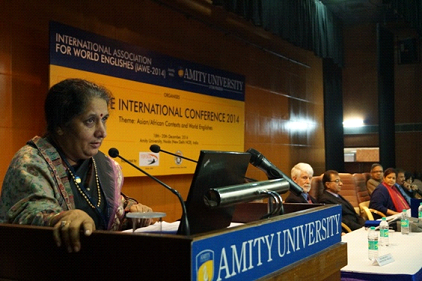AIESR organized a four-day conference from July 2018 to October 2019. In the Inaugural session the chief guest was His Excellency Sri Yogesh Punja, High Commissioner of the Republic of Fiji in India. In his speech, the High Commissioner suggested the preservation of Indian culture despite learning English. Tom Birtwistle, Director of the British Council for North India appreciated the multilingual profile of India where English has a major role to play. The conference had a well-planned academic menu to cater to the eager listeners with more than 500 paper presentations apart from six Plenary Talks.
Amity University in association with International Association for World Englishes (IAWE) organized the 20th International Conference on “World Englishes” on the theme ‘Asian/African Contexts and World Englishes’ in Amity University Campus, Sector 125,Noida. The conference focused on different aspects of English including the learning, research, pedagogy and functional usage of English. The event witnessed the presence of more than 150 delegates, researchers, academicians and scholars from 37 countries. The conference received more than 200 abstracts from all across the world.

Prof. (Dr.) Balvinder Shukla, Vice Chancellor, Amity University adderessing the gathering
This workshop addressed the issues of introducing a variety of authentic texts and enabling diversification in teaching methods by using language learning through literary works to promote appreciation, greater empathy and creativity
On 20 February 2019, Tuesday, 11:00 AM onwards at Room No. 417, IV floor K-3 Block, AIESR, AUUP on W B Yeats’ Indian ‘Progress’: Orientalist, Decoloniser, Postcolonised, Convert by Prof Sean Golden, Visiting professor at Università Ca’Foscari Venezia (Italy) and Universidade de Coimbra (Portugal). The objective of the talk emphasized on W B Yeats’ Indian ‘Progress’: Orientalist, Decoloniser, Postcolonised, Convert was to offer young researchers and scholars a glimpse of the new paradigms in Irish Studies, particularly in the area of Yeats Studies. Since in a post globalized world, we are moving into the realm of comparative studies to understand the different aspects of art and literature from numerous vantage points in an attempt to read into the intersections of literature, art, politics and society, this insightful talk on Yeats's postcolonial and transnational creative imagination will bring forth the effect of India, Asia and Eastern knowledge systems on Yeats's mind, thereby opening up new vistas for comparative and postcolonial studies.
English has taken its own shape in India due to its usage. The diversity of our nation fashioned the importance of English. We are dreaming about New India but most of the potential learners are still living in Old Bharat. English is being taught in the schools of old Bharat in Angrezi or respective native languages of the various states of India. Teachers are still in dilemma to use L1 or L2 because the learners are using the forms and structures of the language of their first language in L2 language which they are learning. The proposal of this project is to find out the effective ways to improve the listening skills of the students.
Statement of ProblemLanguage learning is a process which can be sufficed only by the facilitator. The methods are meant to be used by the instructor/teacher/facilitator in the classroom. We believe that the best method is the one which gives an output in the form effective learning, and it may always vary from context to context, learner to learner, teacher to teacher. As per the Bloom’s taxonomy creating is the ultimate learning outcome. The learning outcome should be in order to promote higher forms of thinking in education, such as analyzing and evaluating concepts, processes, procedures, and principles, rather than just remembering fact. So, we are looking for an approach by which High order thinking skills (HOTS) can be inculcated in the learners. This project aims to find out what approach and what method will enable learners to improve the Students’ listening comprehension skills under a set of particular circumstances.
Probable CausesApproach of teaching English
Poor Vocabulary
Poor knowledge of grammar
Lack of Interest in the lesson taught